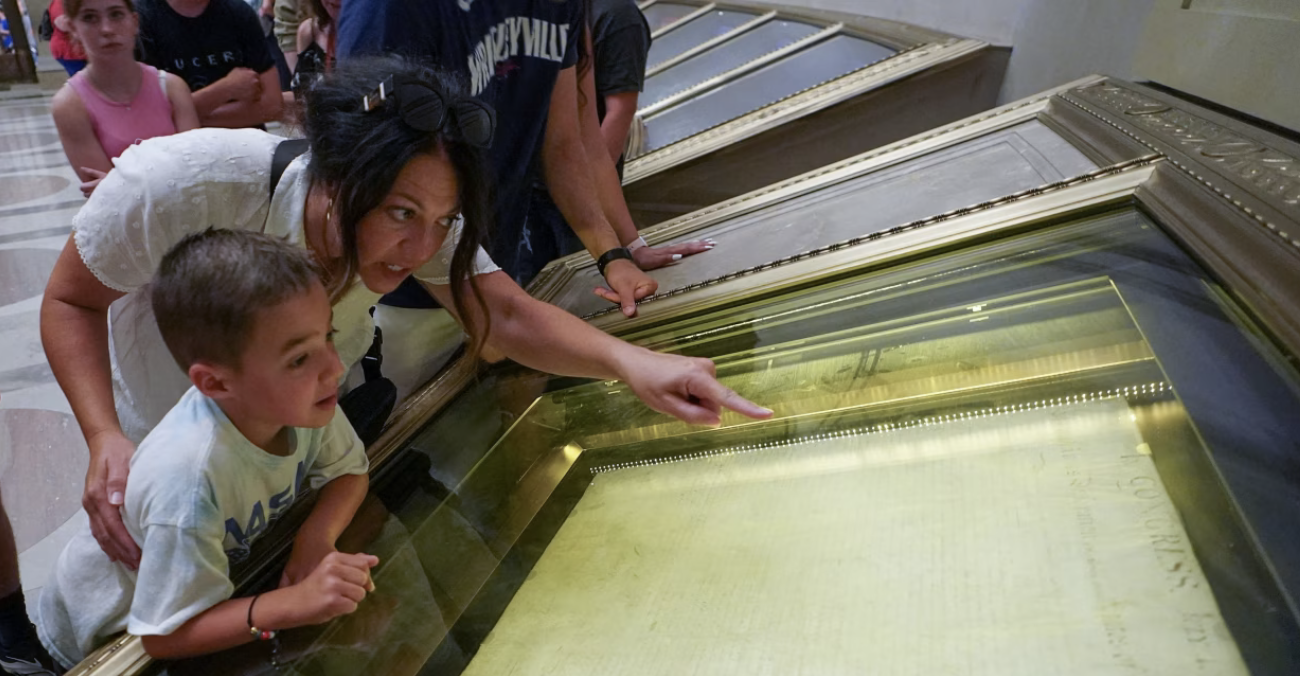By: karl Rove – wsj.com – July 2, 2025
The nation’s 250th anniversary is a chance to relearn our founding principles.
It might seem odd that our focus isn’t the first shots fired at Lexington and Concord (April 19, 1775), the British surrender at Yorktown (Oct. 19, 1781) or the signing of the peace treaty (Sept. 3, 1783).
Instead, our attention is on the Declaration’s approval on July 4, 1776. The reason? It was the seminal event in the creation of the United States, and world-changing too.
The “self-evident” truths that “all men are created equal” and “endowed by their Creator with certain unalienable rights”—alongside the explanation that “to secure these rights, Governments are instituted among Men, deriving their just powers from the consent of the governed”—outlined a Novus Ordo Seclorum, a New Order of the Ages. There had never been anything like it.
Requiring consent, majority rule, and equality before the law ensured that people no longer existed “in a fixed hierarchical order,” overseen “by divinely chosen kings,” as historian Allen Guelzo argues in his new volume, “Our Ancient Faith.” Instead, they were citizens in a representative democracy, free to debate the merits of leaders and choose them through elections.
Abraham Lincoln understood the magnitude of what had happened. What held the nation together through the American Revolution and after “was not the mere matter of the separation of the colonies from the mother land,” he said. It was “that sentiment in the Declaration . . . which gave liberty, not only to the people of this country, but, I hope, to the world, for all future time.”
Yet many Americans have seemingly lost sight of the treasure those 56 delegates who met in Philadelphia left us. We should heed the words of one of the American Revolution’s greatest historians, Gordon Wood. In a recent speech he called the Declaration “the most important document in our history,” for “it sums up the principles by which the nation lives. Indeed, it is what holds us together as a nation.”
The Declaration’s 250th anniversary, Mr. Wood said in another recent talk, would be “a good time to find out what our Revolution was all about.”
Wise counsel. We’d be better off as a country if, individually as well as in our families, neighborhoods and communities, we use the next year to read, think and talk about the American Revolution. That would help us realize how significant the U.S. founding was to world history and our responsibility in the timeless struggle to live up to the Declaration’s ideals.
We’ll have help. On Nov. 16, Ken Burns, Sarah Botstein and David Schmidt will premiere a six-part, 12-hour PBS documentary, “The American Revolution.” Written by Geoffrey Ward, it took eight years to make.
Despite having done films on the Civil War and Vietnam, Mr. Burns told me he was taken aback by the Revolution’s brutality. One of every three deaths was by bayonet. Warriors were often teenagers and the violence deeply personal, as when a young Vermont loyalist killed his best friend in hand-to-hand combat at the Battle of Bennington in 1777. Per capita there were more deaths in the Revolution than during the Civil War. Yet out of the carnage emerged the world’s first continent-spanning democracy.
Americans who want to dig deeper need not wait for November. There are many new books on the Revolutionary War that are well worth the read. The best are from Pulitzer-Prize winning military historian Rick Atkinson, who crafted a trilogy on the war for America.
He provides amazing detail and masterful staging. You’re in the action, seeing the violence that bitterly divided neighbors and families and understanding how close-run the war was. The vivid details, the intimacy, the sense of immediacy are a result of studious research. Like Mr. Burns, Mr. Atkinson mined the vast corpus of memoirs, letters, diaries and dispatches of the surprisingly literate combatants.
Two of Mr. Atkinson’s three volumes are out: “The British Are Coming,” which covers 1775-77, and “The Fate of the Day,” going from 1777-80. I can’t wait for the third.
Other great historians who have written works about the revolution worth dipping into—Bernard Bailyn, Daniel Boorstin, Joseph Ellis, John Ferling, David Hackett Fischer, Richard Ketchum, David McCullough, Robert Middlekauff, Edmund Morgan, Nathaniel Philbrick, Jack Rakove and Alan Taylor. There are even two who lived through the Revolution: David Ramsay and Mercy Otis Warren.
To celebrate the 250th anniversary is fine. To live up to the Declaration’s promise, however, we must honor its critical role in history by better understanding whence America came and why. No better place to start than the beginning; no better time than now. You have your assignments. July 2026 isn’t far off.
To see this article in its entirety and to subscribe to others like it, please choose to read more.
Source: The Declaration of Independence Made America Great – WSJ
 Listen Online
Listen Online Watch Online
Watch Online Find a Station in Your Area
Find a Station in Your Area









 Listen Now
Listen Now Watch Online
Watch Online
